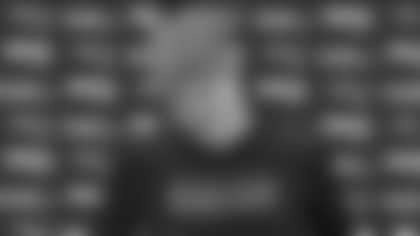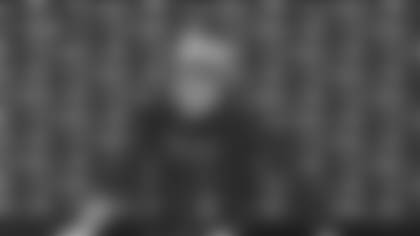[wysifield-embeddedaudio|eid="489301"|type="embeddedaudio"|view_mode="full"]
BB: Yeah, no it wasn't third down. We used our linebackers based on the personnel group that we had called, so those groups could have come up at any time. So yeah, that's how we did it.
Q: Elandon Roberts seemed like he was all over the field along with Dont'a Hightower yesterday. What are your comments on the play of the linebackers?
BB: I think overall, we had our ups and downs. At times we played well defensively and at other times, not so well. It was good enough to win. It was good at times and then at other times I think we really – I think we're all disappointed, so we really just need to do a better job. That's pretty much across the board – the running game, the passing game, everything. I mean there were some things that just, we need to do better.
Q: What did you see on Tyrod Taylor's touchdown run up the middle?
BB: We ran a blitz and obviously, he split us. We had a gain inside, we just lost him and he got through a gap there. Just good vision, good awareness by him and we just, we were close but we just didn't quite have it and he finished the play in the end zone.
Q: What did you see on Danny Amendola's kick return to start the second half in terms of his decision making after he fielded the ball and what the guys up front were doing to help him along the way?
BB: We had good blocking on the return. Danny [Amendola] did a good job of setting up the blocks. We had two double-team blocks on the play and both of those doubles were very good. We got the three and the four both kind of moved out of there so there was quite a bit of space. [We] did a good job on the kickoff blocks. [Barkevious] Mingo and [Patrick] Chung had big blocks on the back side to get Danny through and Danny did a nice job of running – broke a couple tackles, beat the kicker. There was a little traffic there where he couldn't really just get through clean at the end. I think they got him on like the 20-yard line, but again, a well-executed play. I think we've had several of those set up, not several, but we've had a few of those set up that looked like they would be pretty good, but we didn't get a chance to return them because they were touchbacks against teams like Pittsburgh that touchback a lot. I thought we might have a chance to get started and I think the players really worked hard and felt like this week with [Dan] Carpenter that we would have a better chance to actually get a chance to return the ball and bring it out, which we did. They did an excellent job of blocking, and as I said, Danny set those blocks up well and then did a good job of finishing the run.
Q: In fielding the ball at the three-yard line, I'm assuming there's really no choice but to field the ball?
BB: Well I think you saw Buffalo do that – let the ball hit on the two-yard line and bounce in. Right?
Q: Is it generally too risky there to let the ball bounce?
BB: We almost always want to catch the ball, regardless of where it is. Once it hits the ground, there are a lot of things that could happen. The ball takes a lot of funny bounces, it's not a round ball, so we want to try to handle the ball when we can handle it. Decision making at that position is a big part of the position. Some of it's the returner, some if it's the short returner. They have to work together on that. But it's also a function of the hang time of the kick and the direction of the kick. For example, if the ball is kicked to the right and you have a left return on, the depth of the ball might be a little bit different. Your judgement and rules on that might be a little bit different than it would be if it was kicked right on a right return as an example. Again, there are a number of factors that come into play but in the end, decision making and ball handling are the most critical things on that play along with not getting penalized. Unless you have good ball handling and don't get a penalty – if you get a penalty, you're not going to have a long return, or a good return for that matter. If you don't handle the ball well, your chances of having a good return are very much diminished because the timing of the play now is off. If you can handle the ball, make good decisions and not get penalized, you at least have a chance. If those things are bad then you pretty much have no chance to have a good play or have good field position.
Q: What are the considerations that go into acquiring a guy like Chris Hogan as far as his skill set, personality as well as fitting into your scheme after he's performed so well against you as a member of an opposing team?
BB: I think probably 90 percent of the process is all the same whether it's a player that we've played against or haven't played against. There are certainly enough, if the players play, there are enough examples in the NFL where you can see how he is going to do against a high level of competition. Through enough games you'll see a variety of schemes and matchups that he'll have to face to have some idea of a projection of how he would be, how you would anticipate him doing for you. That's a much tougher evaluation in college because the level of competition isn't consistent and the schemes aren't necessarily all NFL schemes. I'm not saying it's good or bad, it's just different. In the NFL, you've got that advantage to be able to see NFL quality players and NFL schemes. I would say that other 10 percent, if it's against your team, then you know the player that you've matched up against and you can evaluate that matchup a little bit better than watching them matchup against somebody else because you have better knowledge of your individual players. There is some benefit to that, but again, I would say in Chris [Hogan]'s case, his situation is a little bit unusual because he didn't have a lot of play time offensively. Some of that came when Buffalo had injuries at the position. I think Buffalo felt they had a lot of depth at the receiver position and that affected a little bit of Chris's play time. When there were injuries, he played more, but he also played very well in the kicking game which gave us an evaluation, not only of him in the kicking game, but also some of skills that you could see on special teams that maybe weren't as evident on offense – blocking for example. Not that he didn't block on offense, but just the number of times blocking on kick returns that you'd be able to see that in space against good coverage players and so forth. I'd saying playing against a guy gives you a little bit more of an evaluation because you can see him against one of your players and that individual matchup, but I think there is a lot more to it than just that. There's the whole body of work that you want to evaluate, not just one game.
Q: Was the rotation at cornerback with Eric Rowe, Logan Ryan and Justin Coleman based purely on matchups or is there something that you're looking for from one of those guys so that you're able to use them more consistently?
BB: I think that's a good observation, Phil [Perry]. I think all those players have practiced well, have played well, deserve to play, and so they all had an opportunity to play. They've all had an opportunity to play on multiple occasions during the course of the season and their performance will dictate future playing time and future opportunities. Some of that, as you noted, is related to certain defensive groupings and packages, and I would say some of it isn't. Some of it is just the rotation and some of it's just, once there is enough evidence in and there is a performance component to it where one exceeds another, then that changes the decision making pattern a little bit. If we have several guys that are playing well and playing competitively, then I don't think there is any reason to just play one and not another one if we can play more than one.
Q: How much improvement have you noticed or seen with Tom Brady's deep ball passing?
BB: I think Tom [Brady] has done a good job on that. He's worked hard and our receivers have done a good job, too. We've gotten behind the defense in position where those throws are a little bit, a little higher percentage, I would say. Really the combination of the quarterback and receiver and the work on both ends for the timing, Tom has done a good job. I thought he made a real good throw to Danny [Amendola] on the scramble play; the vision, and to be able to get back to the other side of the field. The play got called back, but it was a very aware play and he made a good throw to get the ball out there. Chris [Hogan] did a real good job of getting behind [Stephon] Gilmore on the touchdown and stacking him. That was not as hard of a throw but it was a really good route. Chris put himself in positon there for that to be a big play. Rob [Gronkowski] with the matchup on [Nickell] Robey-Coleman – again, a good route, a good throw, good execution on both ends there. I think we've hit more of those, certainly on a higher percentage than we have at some other points. Hopefully, that will continue. We had some good opportunities yesterday. I would say even overall here in the last two or three games, we've had some opportunities where teams have played us without really a deep field player, either one or two. A lot of times they've played some quarters, some variation of blitz-type coverage, things like that where there has been less defense in the deep part of the field and that's created some opportunities for the receivers and the quarterback.
Q: In defending a play like yesterday's when the punter dropped the ball and ran for 16 yards, what is the fundamental coaching technique for those players so that can be avoided?
BB: I'd say there are a couple things involved for. One, that wasn't unexpected, we actually practiced that play last week in practice. That honestly wasn't – I don't think anybody was surprised by what happened. I think just the particular call that we had on and just the way the play unfolded led to a favorable play for them and a bad play for us. I think it starts with coaching. We've got to do a better job of coaching that play. We can't let that happen. We can't get the fourth-and-13 and not end up with the ball on the next play. It starts with me. We've got to do a better job of coaching. We've got to take care of that and we will. With the players, there's always an awareness. Sometimes, they can be put in a tough spot of trying to stop a guy from going downfield and also having vision on the punter and the play so I think that could be better. It could certainly be better coached, so it's like a combination of the two. In all honesty, there was some good fortune involved on that, again, the way the way the play turned out. But again, that's our fault. We created an opportunity and they took advantage of it. That's just not good enough on our end. It's really a combination. It should never happen, but it happened and we've got to keep that from happening again.







































